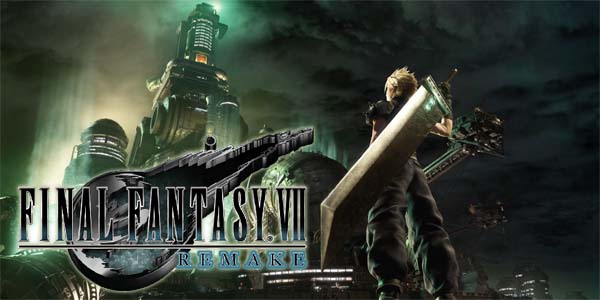
Well I think I waited long enough before playing and reviewing this game that I'm probably not spoiling anything by saying that Final Fantasy VII Remake takes some interesting creative liberties with the original's story. Those hoping for a one-for-one re-telling of the 1997 PlayStation classic might be disappointed that Remake only covers the early half of the original's first disc. It doesn't even make it as far as the emotional sucker-punch (and ludic shake-up) that was the conclusion of the original's first disc. But then again, that opening act is very faithfully recreated and expanded here, and the narrative curveball that this remake throws is bold, creative, and an interesting artistic statement about the reverence for the original masterpiece.
The decision by Square-Enix to put the word "remake" in the title is a deliberate, and important choice. This game isn't simply Final Fantasy VII (2020) in the way that the remakes of Shadow of the Colossus, Demon's Souls, Resident Evil, or even Resident Evil 2 are. Resident Evil 2 takes dramatic creative liberties with gameplay feel by ditching the static camera in favor of an over-the-shoulder shooter, but despite the wild deviations from the original's fundamental game design, the remake is still an effort to recreate the original game's story, environments, and game strategy in all the ways that matter.
No, Final Fantasy VII Remake puts the word "remake" in its title because at the same time that Square-Enix is remaking the original Final Fantasy VII, the game itself is remaking the story and continuity. Final Fantasy VII Remake does not seek to be an upgrade that replaces the original game. The story of the original game exists within this new game's canon, and is being remade within Remake's own fiction. In so doing, it plays with the ideas of fate and destiny. The sky is the limit for where the sequel(s) go from here.
Square imitated Paramount's attempt to keep the original Star Trek's existence as part of the reboot's continuity.
Square-Enix is trying to do with Final Fantasy VII Remake what J.J. Abrams and Paramount tried to do with the 2009 Star Trek reboot: write the original's existence into the continuity of the reboot. Yet Final Fantasy accomplishes this so much more successfully because, unlike Star Trek (2009), Final Fantasy VII Remake tells its revised story while still remaining faithful to the ideals, themes, and spirit of the original. Star Trek (2009) and its sequels (with the possible exception of Beyond) only took the campy space-adventure aspect of the original Star Trek, but did not replicate the thoughtful science fiction and character drama that the original was known and beloved for.
Final Fantasy VII Remake on the other hand, replicates the ludic complexity, strategy, and versatility of the original's character-development and materia systems, and retains all of the original narrative's themes of classism, environmentalism, and the fuzzy line between "protest" and "terrorism" (a question that has become increasingly relevant in recent history). Its expanded length even allows it to explore some of these topics in much greater detail. It also allows the game to further explore some of the relatively minor side characters from the original, giving them more depth and significance in the story (some more successfully than others). It does all this while re-creating the original characters almost exactly as they were. Eat your heart out, J.J. Abrams...
Remake probes the limits of the fuzzy line between "protest" and "terrorism".
It's an idea so crazy that it just might work; an idea both ridiculously dumb, but also ingeniously subversive. I just hope that it doesn't fall into the same trap of ridiculous self-indulgence and pretentiousness that killed my interest in Kingdom Hearts by the time the end credits of Kingdom Hearts 2 were rolling. I had lost all interest in Kingdom Hearts 3 about a decade before it released, and never bothered to play it. I hope the same does not happen with the final installment(s) of Final Fantasy VII Remake.
I hesitated to buy this remake when it released because Square had announced that it would be broken up into episodes. I wasn't sure if I would have time to play through three or five acts of a remake of Final Fantasy VII if each act was going to be 40+ hours long (and $60 each). With a new console generation coming out, I also wasn't sure if I would be needing to transfer my save file for the sequels, and if a PS4 save file from episode 1 would be compatible with the PS5 to which episode 2 is certainly going to be exclusive.
If the content offered in this first episode is indicative of the plan for the whole series, then the complete remake looks like it would need to span eight or nine episodes, and take another 20 years to be released. But that might not necessarily be the case, since the end of the first episode implies that the sequels are going to diverge considerably from the original game, such that every scene and plot beat from the original may not need to be recreated. So maybe my concerns will be vindicated, or maybe they won't. [More]
51dad9a6-b345-4bf9-9484-b0c36bae9ce6|1|5.0
Tags:Final Fantasy VII, Final Fantasy VII Remake, Final Fantasy, Squaresoft, Square-Enix, Cloud Strife, Tifa Lockhart, Barret Wallace, Aerith Gainsborough, Sephiroth, wraith, retcon, materia, Shinra, Buster Sword, Midgar, mako, Lifestream, limit break
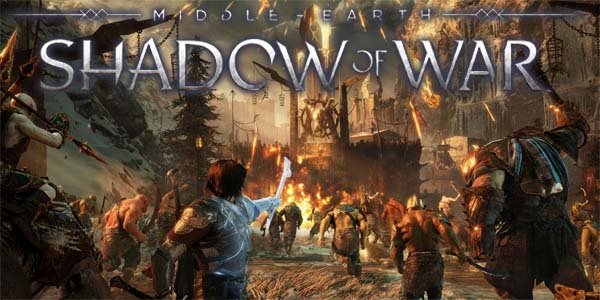
Dang. I was really hoping to have this out before the end of the year...
Shadow of Mordor was easily one of my favorite games of 2015, and one of my best reviewed games of that year, and I even cited it as an example of successful open world game mechanics. I've praised the game for its tightly-focused design, relatively limited scale, and the fact that it didn't waste the player's time with an excess of meaningless collectible hunts.
"The developers showed plenty of restraint in many areas of design so that they could focus on the innovative new feature that everything in the game revolves around. The design is tight and streamlined. They didn't waste the player's time with an excessively large, complicated map, or a multitude of irrelevant mini-games and side quests."
- from my Middle-Earth: Shadow of Mordor review
Yes, the original game did have some collectible hunts. It did have some filler content. It did have bullshit, game-y missions with arbitrary win/loss conditions. But those issues weren't pervasive enough to bring down the game as a whole, and the game generally flowed very smoothly. In their quest to mindlessly monetize the sequel, Shadow of War, Warner Brothers and Monolith have doubled down on both the best elements and the worst elements of Shadow of Mordor, and the result is beautiful when it works, and ugly when it doesn't.
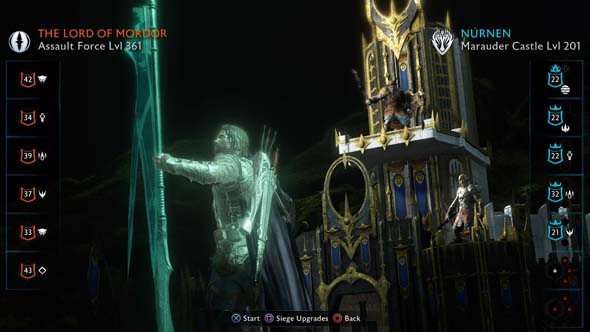
You now recruit orc captains to defend fortresses from Sauron's army.
The biggest problem is that the game now feels like a grind. In order to get you to pay for in-game, randomized micro-transactions called "War Chests", the campaign has been needlessly padded-out. Instead of having the option to hunt down uruk captains for the utilitarian purposes of gaining intel or gathering an army of mind-controlled slaves to do your bidding, you now must recruit orc captains into your own army in order to siege and then defend castles and fortresses from Sauron's counter-invasion. In principle, this sounds like a brilliant idea! I've often criticized open world and sandbox games for not having actual threats or consequences that pressure the player into acting. In fact, requiring that the player defend and hold captured strongholds from enemy counter-attacks is exactly the sort of thing that I've proposed as a compelling way to keep the game world feeling alive, and to keep the villain actually feeling threatening and antagonistic.
The problem is that (aside from one scripted castle defense) all the castle defending is back-loaded into the final act of the game. At this point, the plot is basically over, ... [More]
ae89c159-d700-491f-810c-2ed2093b5137|0|.0
Tags:Middle Earth: Shadow of War, Middle Earth: Shadow of Mordor, the Lord of the Rings, Monolith Productions, Warner Brothers Interactive Entertainment, J.R.R. Tolkien, Talion, Celebrimbor, orc, undead, wraith, elf, Middle Earth, Sauron, Shelob, Brûz The Chopper, action, open world, sandbox, parkour, RPG, micro-transaction, war chest, loot box, eBay
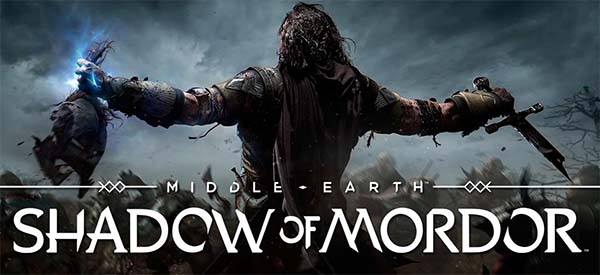
Shadow of Mordor was a game that almost sold me on the next gen consoles. I knew I was going to need a PS4 for Bloodborne, and I was very tempted to buy one early so that I could play Mordor. The central game mechanic of orc NPCs fighting amongst each other in order to become Sauron's personal favorite sounded like an interesting mechanic for organic story-telling. It was a concept that sounded like something truly deserving of the name "next gen". The biggest thing that held me back was the fact that the game was also available on last-gen consoles, so I figured it probably wasn't pushing any serious boundaries of game design.
Bat-Assassin's Creed: Arkham Middle Earth
The basic gameplay is highly derivative of Assassin's Creed and the Batman Arkham games. It ports both of these feature sets more or less as competently as those original games, including the same perks and problems. The free running feature suffers from the same lack of control that plague's Assassin's Creed, in that it's sometimes hard to predict exactly where the character will land, and he loves to climb up a wall if you run too close to it. Is it really that hard to allocate a dedicated "climb" or "jump" button?! In Mordor's defense, every button on the controller is mapped to something, so at least it has an excuse (unlike Assassin's Creed with its redundant jump button).
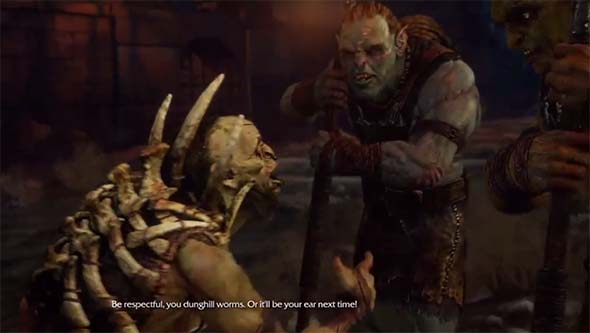
The martial culture of the orcs means that when they find a dead comrade,
they assume he was murdered by an ambitious peer, leaving the player off-the-hook.
Stealth mechanics work pretty well; although the orcs are a bit oblivious to my movements through the game world. Sometimes, I can be moving right across their field of vision within 10 feet of them, but because I'm crouched or hanging off a wall, they just don't see me. Orcs don't care much about each other. Their martial culture means that when they find a fellow orc dead, they assume that he was killed due to his own stupidity, or in a brawl / duel with another orc. This removes the need to drag and dispose of bodies while also masking the fact that orcs don't look for the player when they find a dead body. There are examples of stealth games in which enemy guards don't notice or care about dead bodies that they find, and that's always immersion-breaking. Shadow of Mordor cleverly turns what could have been an immersion-breaking limitation of the A.I. into an appropriate element of the world and narrative. As long as they don't actually see you kill their fellow orc, you can rest assured that throwing an archer off a ledge won't alert any guards who pass below to your presence.
Combat mechanics are almost identical to Arkham Asylum, except you have an ethereal bow instead of all the gadgets or grappling hook. But it also blends some elements of Assassin's Creed insta-kills into the fighting mechanics as well. Fights are much more challenging than in Assassin's Creed because you can't insta-kill enemies when you parry them. Instead, you can stun them and then perform an execution or coup de grace, but you're not impervious during this time. You have to time your coup de graces appropriately in order to avoid being hit in the middle of slitting a prone orc's throat. There are insta-kill special attacks that behave a bit more like Assassin's Creed's counter kills, but you have to build up a combo streak before they become available.
Executing a coup de grace [LEFT] on a single orc in a mob requires split-second precise timing.
Or you can perform a combat execution [RIGHT] mid-combo if you get your hit streak high enough.
Attacks are fluid, controls are responsive, timing is tight, and you can counter or dodge out of any single attack or action. This all combines to give the player a tremendous sense of control as long as you are patient and deliberate in your button-pressing. The strict timing will severely punish you for button-mashing, which makes the combat challenging and satisfying throughout the game. [More]
e19c6919-e126-48e1-86f1-53470b917754|2|3.0
Tags:Middle Earth: Shadow of Mordor, the Lord of the Rings, Monolith Productions, Warner Brothers Interactive Entertainment, J.R.R. Tolkien, orc, undead, wraith, elf, Gollum, Smeagol, Mordor, Middle Earth, Sauron, Lathariel, women, equality, gender equality, action, open world, sandbox, parkour, RPG, movie tie-in
|

| 12 | | | | | | | 60 | | 11 | | | | | | | 55 | | 10 | | | | | | | 50 | | 09 | | | | | | | 45 | | 08 | | | | | | | 40 | | 07 | | | | | | | 35 | | 06 | | | | | | | 30 | | 05 | | | | | | | 25 | | 04 | | | | | | | 20 | | 03 | | | | | | | 15 | | 02 | | | | | | | 10 | | 01 | | | | | | | 05 |
|